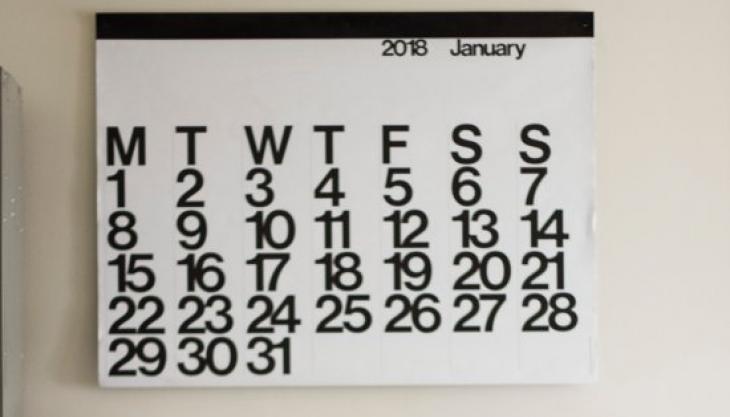How the 180-Day Rule Could Change Your Wilmington Bankruptcy Outcome
Submitted by Rachel R on Wed, 06/27/2018 - 9:26am

Bankruptcy timelines matter
Image via Unsplash
In Wilmington bankruptcy, 180 days is a magic number in many respects. In this article, we’ll look at the six-month line for income, inheritances, and other events that can affect the outcome of your case. These are things you must know before you file a bankruptcy case.
Bankruptcy 180-day Milestones
The first 180-day benchmark to know relates to limitations on filing Chapter 7 or Chapter 13 bankruptcy. The law says you cannot file Chapter 7 or 13 bankruptcy if you had a previous bankruptcy case dismissed within 180 days (under certain circumstances) of the date you intend to start a new case.
If you had a case dismissed because you didn't show up to court when asked, didn't submit requested documents, or asked for dismissal because creditors were trying to void the automatic stay, you are subject to the 180-day limit.
The second 180-day concern for bankruptcy filing is about credit counseling required by law. You must complete, within 180 days before filing, the mandated credit counseling course from an approved agency to be eligible to proceed with your bankruptcy case. Usually, your lawyer will set it up for you on the day you go in for a consultation or file your petition.
180-day Money Matters
In addition to the two issues listed above, there are several six-month limits on cash received or potential money inflows that could alter your Wilmington bankruptcy estate. These tie to items such as inheritances, settlements, court judgments, and any other cash windfalls that you did not have in hand when you filed your case.
Inheritance and life insurance
If you receive an inheritance within 180-days of filing your case, it becomes part of your bankruptcy estate. Even if you don't have the cash in hand within six months of filing your case, if you become aware within that 180-day period that you are owed the inheritance, it becomes part of your bankruptcy estate.
What matters is when you became entitled to the money. In the case of an inheritance or life insurance policy, the date that the person died is when you became entitled to the cash. It might take months or years to sort it out, but if your benefactor’s date of death falls into the 180-day window, you must tell your North Carolina bankruptcy lawyer, who will then notify the court and Trustee.
Personal injury judgment or settlement
When you go in for a Wilmington bankruptcy consultation with your attorney, one of the things they ask you about is whether you have any pending legal actions. So, if you have an existing personal injury suit underway when you file bankruptcy, the amount you could potentially receive is part of your bankruptcy estate. The 180-day rule may apply in a Chapter 13 case, but not a Chapter 7 for this issue.
With a personal injury case, the date of the injury that triggered the lawsuit matters. If you were in a car accident a month before you filed bankruptcy, any personal injury award for that incident is part of your bankruptcy estate. An accident or injury that occurs even a day after your bankruptcy discharge typically would not be part of the bankruptcy estate.
Divorce and property settlements
In general, settlements of cash, assets, or property in a divorce fall under the 180-day rule. A divorce or post-divorce settlement action pending when you filed bankruptcy might be relevant to your bankruptcy case. If you receive property (or determination of settlement) from the divorce within 180 days after the discharge of your bankruptcy, you should alert your attorney.
The rule of thumb when speaking with your North Carolina bankruptcy attorney is to disclose all financial information and let them determine what’s pertinent. For your lawyer to best represent you, they need full disclosure and all relevant information, so don’t hold back anything. Transparency can protect you from accusations of bankruptcy fraud (which no one wants).
To find out more about life-changing debt relief, read reviews from our clients, then contact the Law Offices of John T. Orcutt. Call +1-833-627-0115 to schedule a free Wilmington bankruptcy consultation at one of our convenient locations in Raleigh, Durham, Fayetteville, Wilson, Greensboro or Wilmington.
Debts Hurt! Got debt? Need help? Get started below!
Serving All of North Carolina
- Bankruptcy Attorneys Raleigh NC (North)
- Bankruptcy Attorney Fayetteville NC
- Bankruptcy Attorney Durham NC
- Bankruptcy Attorneys Wilson NC
- Bankruptcy Attorneys Greensboro NC
- Bankruptcy Attorneys Southport NC
- Bankruptcy Attorneys Wilmington NC
Bankruptcy Attorneys Raleigh NC (North)
6616 Six Forks Rd #203 Raleigh, NC 27615 North Carolina
Tel: (919) 847-9750

Bankruptcy Attorney Fayetteville NC
2711 Breezewood Ave Fayetteville, NC 28303 North Carolina
Tel: (910) 323-2972

Bankruptcy Attorney Durham NC
1738 Hillandale Rd Suite D Durham, NC 27705 North Carolina
Tel: (919) 286-1695


Bankruptcy Attorneys Greensboro NC
2100 W Cornwallis Dr. STE O Greensboro, NC 27408 North Carolina
Tel: (336) 542-5993

Bankruptcy Attorneys Southport NC
116 N Howe St. Suite A Southport, NC 28461 North Carolina
Tel: (910) 218-8682

Bankruptcy Attorneys Wilmington NC
116 N. Howe Street, Suite A Southport, NC 28461 North Carolina
Tel: (910) 447-2987
